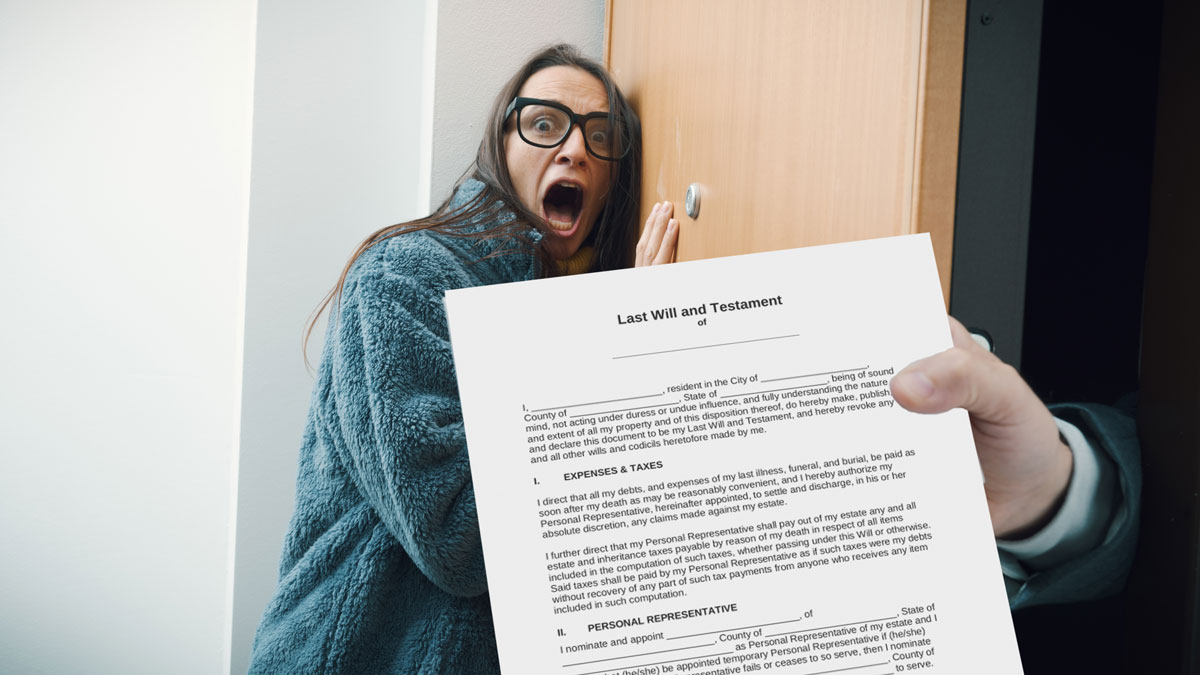Estate planning anxiety: conquer your fears and secure your family’s future

Estate planning is an emotional journey for many, often entangled with the fears of confronting mortality, navigating complex decisions, or addressing family dynamics. However, facing your estate planning fears head-on can bring peace of mind, help you avoid costly mistakes, and ensure your loved ones are taken care of. Let’s explore the emotional barriers, common fears, and practical steps you can take to tackle estate planning with confidence.
Table of Contents
- 1 The emotional barriers of estate planning
- 2 The root of estate planning fears
- 3 Consequences of avoiding estate planning
- 4 Overcoming common estate planning fears
- 5 3 Behavioral strategies for overcoming estate planning anxiety
- 6 The role of estate planning attorneys
- 7 The role of a financial advisor
- 8 Final thoughts: don’t face your estate planning fears alone!
The emotional barriers of estate planning
When my wife Julie and I sat down to create our estate plan, we were faced with a reality we didn’t want to imagine: what would happen to our daughter if we weren’t here? For many, estate planning stirs emotions tied to mortality and the unknown. Parents worry about appointing guardians, individuals fear health crises, and some struggle with entrusting others with important decisions.
The emotional barriers to estate planning often manifest as:
- Avoidance: Pretending the issue doesn’t exist
- Procrastination: Putting it off indefinitely
- Defensiveness: Resisting the process due to its discomfort
Acknowledging these feelings is the first step. Once you name the barrier that’s holding you back, you can start breaking it down.
Do any of these challenges feel familiar to you?
The root of estate planning fears
Confronting mortality
Estate planning forces us to imagine our own death and other scenarios we would like to avoid such as illness, incapacity, or the loss of our spouse. It can be a scary topic to explore, but many people find that once their estate plans are in place, they feel less anxious about death, illness, and injury. They find peace of mind in the knowledge that their wishes are documented and that everything is taken care of.
Financial security concerns
Many people worry they won’t leave enough money to support their loved ones. In fact, roughly one-third of people feel that the most damaging result of a poor or missing estate plan is leaving loved ones without enough money! This fear can lead to hesitancy about assigning someone to manage your finances or worrying that your children won’t handle their inheritance responsibly. Again, estate planning can help soothe this fear by providing reassurance that your loved ones will have what they need and that your assets will be distributed as you intended.
Family dynamics
The fears of sparking conflict among family members – or worse, uncovering something you don’t want to know – are some of the most significant barriers to estate planning. Some people avoid planning altogether because they anticipate disputes or difficulty deciding who should take on key roles, such as executor or guardian.
Complexity of the process
Honestly, estate planning is complicated. If you you’re feeling overwhelmed just thinking about it, you’re not alone. I find people put off this important task most often because they dread making so many decisions or are intimidated by the legal jargon – or both. Seeking support from professionals who can take you through the process step by step, such as estate planning attorneys or financial advisors can make the process far less intimidating.
Consequences of avoiding estate planning
Only 32% of Americans have a will, according to Caring.com, but the risks of delaying or avoiding estate planning can be severe.
Legal disputes and taxes
Skipping estate planning leaves your assets exposed to taxes, fees, and time-consuming legal challenges that could be avoided entirely by planning ahead.
Probate court locks up your assets
Without clear instructions, the courts may be the ones to decide how to distribute your assets. Your accounts and property can get stuck in probate limbo for months or even years, preventing your hard-earned wealth from benefiting the people you care about. For example, a house titled solely in your name may sit idle until the probate process concludes, preventing your heirs from selling it.
Estate taxes take a big bite
Depending on the value of your estate and the state in which you live, federal and state estate taxes can cost your heirs a lot of money – sometimes hundreds of thousands of dollars – that could have stayed in the family with proper estate planning. In Massachusetts, only the first $2 million of your estate is exempted from estate taxes.
Added stress for loved ones
One of the most profound consequences of avoiding estate planning is the emotional burden it places on your family. That’s why I often tell clients that creating an estate plan (and keeping it up to date) is the greatest gift they can give their loved ones.
Stress and grief
The only thing worse than going through the emotional turmoil of losing a loved one is then having to scramble to figure out what to do with their assets. Your family will be emotionally and psychologically strained and managing your estate without a clear plan just compounds that.
Financial hardship
I’ve heard many stories in my career that go like this: mom passed away with a brokerage account with no beneficiaries, so things got complicated; we had to go to probate court and get an executor named and it took forever. Or, mom’s checking account was locked up in probate and we couldn’t afford to pay the bills that kept piling up so we took on debt. You may think you’re leaving your family a small fortune, but if you haven’t created the estate plan necessary to help them access it, they may find themselves struggling financially after your passing.
Strained relationships
Without a clear estate plan, your family is left to figure it out on their own. They’re all coming into this situation with different ideas about what you would have wanted, or what the reality of their relationship with you was, which creates a breeding ground for conflict. By doing the work now, while you’re able, you can save your family a lot of trouble. This can be especially important when it comes to end-of-life wishes when siblings may disagree about the kind of care mom or dad would have wanted.
Missed opportunities
When you don’t have an estate plan, you lose the ability to make intentional decisions about your legacy and provide guidance to your heirs.
Making decisions from beyond the grave
Your estate plan, and more specifically, a trust, can give you the ability to control what happens to your assets after you pass. You can use your trust to support charitable causes, leave bequests to people who were meaningful to you, or even provide for your pets.
Giving your family structure
If you have a $5 million estate and three kids in their 20s, will there be three new sports cars in the driveway the week after you pass away? Including a trust in your estate plan allows you to structure distributions to protect your family and your wealth. Often, those distributions are tied to reaching a certain age or achieving important milestones.
Communicating your values
Estate plans typically contain documents like an advance healthcare directive or healthcare proxy that provide instructions for how you want to be cared for while incapacitated or at the end of your life. Other documents, like your will and trust allow you to communicate your wishes for family and loved ones. Maybe you want your family to use their inheritance to take a big vacation together every other year. Or perhaps it’s important to you that someone continues the family business.
Overcoming common estate planning fears
Here’s how to tackle the most common estate planning fears and hesitations:
“I don’t have enough money to even need an estate plan.”
Estate planning is not just for the wealthy, and it’s not just about money, either. Your estate plan is about making sure your wishes are respected, no matter your net worth. Ask your financial advisor or another trusted source for a referral to an estate attorney who would suit your needs.
“I’m afraid I’ll make an irreversible mistake.”
The good news is most estate plans are not set in stone, and you can (and should) change them when your situation or choices evolve. If you’re concerned about making a big mistake, ask your attorney or financial advisor about the process for making updates to your estate plan so you can rest easy knowing you can still change your mind.
“I don’t want to lose control of my assets.”
It is a common misconception in estate planning that you somehow give up control of your wealth. If this is something you worry about, I recommend taking a closer look at the types of documents that would be in your specific estate plan (or asking a professional). In some cases, such as with a financial durable power of attorney, you give control to someone else only during certain qualifying events. With a trust, you often gain more control over your assets, even beyond your death.
“I worry talking about money will start a fight.”
The more your family communicates about money, the easier it gets. Start small and work your way up to larger, more in-depth family meetings. You don’t need to solve everything in one afternoon.
“I’m concerned about what I might find out.”
Worry instead about what you might not find out! It’s better to know upfront that your preferred healthcare proxy won’t honor your wishes surrounding life support or that your nephew who stands to inherit everything has been hiding an addiction. Clear, honest communication is a key part of successful estate planning.
“Estate planning is too much for me to deal with right now.”
This may be a case where the anticipation is worse than reality, like getting a flu shot. When I help my clients with their estate plans, I find that focusing on one decision at a time makes the process easier. Try breaking the process down into smaller, bite-size pieces and don’t worry about getting everything done at once.
“Estate planning is too confusing!”
Be upfront with your financial advisor and estate attorney about this concern. A good partner will walk you through the process and help you understand as much or as little of the legal and financial jargon as you want.
“I can’t afford to make an estate plan.”
The cost of estate planning can range from a couple hundred dollars to create legal documents online through a tool like LegalZoom, to tens of thousands of dollars to hire an attorney to manage a large, complex estate. Decide not just how much you can afford to spend, but how much your family can afford in taxes or how long they can wait for probate court should you skip estate planning altogether.
Note: At Berkshire Money Management, if we manage $250,000 or more of your investments, we cover some or all of the estate planning fee for you as part of our service.
3 Behavioral strategies for overcoming estate planning anxiety
Reframe the Process
Instead of a legal process, think of estate planning as an act of care for your loved ones.
Start Small
Begin with easy decisions, like naming a healthcare proxy (the person who will make medical decisions when you’re incapacitated), to build momentum.
Seek Support
In addition to your estate planning attorney, a Behavioral Financial Advisor like me can help address the emotional and financial aspects, guiding you step by step.
The role of estate planning attorneys
While financial advisors and planners can help you understand your estate planning needs and walk you through the emotional and financial process, you’ll need an attorney specializing in estate planning to create all the legal documents.
Your estate planning attorney may help you create several documents. Some of the most common include:
- Will
- Living (revocable) trust
- Irrevocable trust
- Durable power of attorney
- Health care proxy
- Advance directive for health care
The role of a financial advisor
I like to develop close relationships with my clients, which means when it comes to estate planning, I’m well-positioned to help them navigate the emotional, financial, and familial elements of the process.
I am constantly trying to be on the lookout for changes my clients may not realize will impact their estate plan because the last thing you want is for your heirs to get a surprise estate tax bill, or to find out at the hospital that your ex-husband is still listed as your healthcare proxy.
Final thoughts: don’t face your estate planning fears alone!
Estate planning can be daunting, but it’s also one of the most loving acts you can do for your family. (And it’s really not so bad once you start). By addressing your fears, seeking professional guidance, and taking manageable steps, you can move forward with your estate plan with confidence. Start today and take control of your future!
Ready to tackle your estate planning fears? Schedule a consultation with one of our experienced financial advisors and let us guide you through the process.
Scott is a Behavioral Financial Advisor, Certified Elder Planning Specialist, and Vice President at Berkshire Money Management. He uses his skills and experience to help clients achieve ambitious goals and help those experiencing major life transitions avoid the pitfalls of emotional decision-making.






